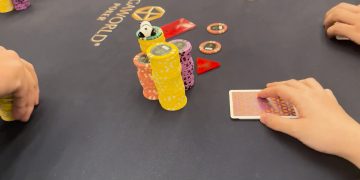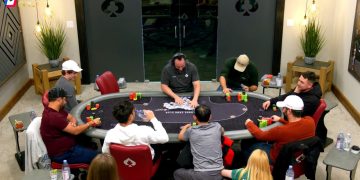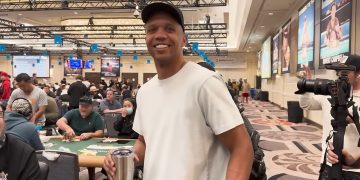Do you really want to know the secret to success in poker tournaments? Do you want a Texas Hold’em Tournament Strategy that actually works? Be aware that if you say yes and choose to read on, you’re not going to like the answer.
The answer is by no means cool, but you have to make a decision between looking like a poker player and actually being a poker player regardless of what it looks like. If you chose the latter, congratulations, but also be prepared for the unexpected. The answer to the question above is: Folding!
I knew you wouldn’t like the answer to that question. How can folding be cool? It’s seems to be against the poker rules. We watch all the poker movies, and in every single one of them, the hero doesn’t fold. That would be seen as weak. This gambling culture that is portrayed in the movies as well as in the poker world is what leads to machismo and ego.
Nobody wants to be seen as weak, but that’s the catch. Who is weak: The one who doesn’t want to be seen as weak because he doesn’t want to be ridiculed OR the person who doesn’t care how others view him and wants to win? The former person is insecure, the latter is not.
Basically, do you have the guts to be shunned by other players at the table? Are you willing to have the reputation of someone who plays ABC poker? Are you prepared for people to view you as someone with “no heart?” If you answered yes to all those questions, then you might actually have a chance at winning. Folding is the single most important Texas Hold’em tournament strategy. It cannot be debated. The reasoning is simple, and it will be explained in the next section.
Texas Hold’em Tournament Strategy: Why Folding Wins

The reason “Folding” is the most important Texas Hold’em tournament strategy is because you will only debate folding if you’re not sure. That sums it up right there. Think about it for a minute and it will hit you like a ton of bricks. If you have the nuts, you’re obviously not folding. If you’re pretty certain you have the winning hand vs. your opponent, you’re not folding. And if you’re pretty certain you have the losing hand, it’s an easy fold. There is only one type of situation where it’s not an easy decision, and that’s when you’re not sure. Now to the good part.
Do your best to reflect on all the Texas Hold’em poker tournament situations where you weren’t sure if you should call or fold. It’s highly likely that the times you called will pop into your mind more than the times you folded (folding becomes a non-event). If you think about all those times you called, I can bet with absolute confidence that you have lost more than you have won. That’s just on a generic hand-by-hand basis. If we start thinking about chips, you lost a ton. And if we start thinking about actual money, we really don’t want to say the number.
When you’re not sure if you should call or fold, there will be times when you make the correct call, and that’s the problem. It’s like hitting a good golf shot even though you’re a terrible golfer. That one great shot keeps you coming back because you know that if you did it once, you’re capable of doing it again. You WANT that hero call because it looks so cool! You NEED that hero call because it boosts your ego.
Did you notice the word I used at the end of that last paragraph? Ego. That is your enemy. The next time you play in a poker tournament, repeat the following phrase in your mind over and over again: “Ego is the enemy.” If you listen to your own voice and apply what you’re listening to, you will have a much greater chance at success.
While you will call and be correct sometimes, you’re usually going to be wrong. Your need to know the answer, it cost you. Or, maybe, you just didn’t want to be embarrassed by your opponent showing a bluff, so you called. If that’s the case, consider the popular poker saying, “You can’t bluff an idiot.”
Think about what that saying means. It means an idiot is the one who is going to call. It also means that it’s easier to bluff or semi-bluff a good player because they don’t throw chips away like a bad player. Therefore, if you call when you’re not sure and your opponent shows a winning hand, that’s when you look like an idiot.
You don’t look like an idiot when you fold. If you fold to a bluff and your opponent shows, the only people who will think you’re an idiot are idiots. The smart players will think the person showing the bluff is the idiot because they’re revealing a ton of valuable information. This, in itself, is poker strategy. Yes … it goes much deeper than the surface, but it’s still easy to understand.
Texas Hold’em Tournament Strategy: WSOP Main Event
Do you know why I’m writing poker articles right now? If you have read my other poker strategy articles, you already know that I play on the WSOP Circuit. You might even know that I was recently in Las Vegas for the WSOP. However, I didn’t stay for the Main Event. The reason for that is very simple: I went backward.
It started out by running terrible. I don’t like to tell bad beat stories, so I’ll keep it simple and tell you that I had AA three times, KK once, and I flopped top set two hands in a row during my first three days playing in a poker tournament. Lost every single one of those hands.
I usually stay cool, calm, and collected regardless of what happens, but once I was halfway through the week and this kept happening (99 vs 55 in a big spot one day later), my Texas Hold’em tournament strategy escaped my brain. Felt like I needed to try something different. Looking back on it, I should have taken an entire day off and played in smaller events. That’s not what happened, and maybe the reason for that is so I could warn you based on my experiences.
For some strange reason, Ego caught up with me during the second half of the last trip. I hadn’t seen Ego at the poker table for about two years. I didn’t want to let him in, but he knocked the door down. Every time I found myself in a spot where I wasn’t sure if I should call or fold, I called. And almost every time I was wrong.
My reputation on the Circuit is patient, disciplined, and crafty. I usually don’t make these calls unless I’m certain, but I’m human. I won a few of those pots, but the losses far exceeded the wins. The second half of my WSOP trip was a disaster.
So, now I’m home trying to make up the losses by writing about Texas Hold’em tournament strategy while all my friends are playing in the $10,000 Main Event with a 1st place prize around $10 million. And this all happened because of Ego. Or, to give you the simpler version, this all happened because I couldn’t find the fold button.
When You’re Zoning
Zoning at the poker table is a wonderful feeling. You know exactly what everyone is holding at all times. You can basically see their poker hands (hole cards). Poker strategy goes out the window at this point because it’s like using the force. But how do you get to this zoning point? I bet you can figure out the answer.
The answer is by “Folding”. Many poker players don’t pick up on the following, but when you fold, you’re consciously and/or subconsciously picking up information and betting patterns around you. Your brain is calculating without you even realizing it, and you use those calculations down the road in the poker tournament to your advantage. There is no Texas Hold’em tournament strategy here other than fold to get to the zone.
I’ll give you a few examples. To be more specific, I’ll tell you about three poker hands that took place in a poker tournament that ended up being the biggest cash of my life.
Poker Hand #1
I was in middle position with
![]()
![]()
Everyone folded to me and I put in a standard raise. The small blind raised me. He was a tall and quiet Asian man, and he had only played one hand in two hours—this hand! I already knew I was in trouble, but I called to see a flop.
Flop:
![]()
![]()
![]()
He bet out relatively small based on his pre-flop raise, so I raised to see where I stood. He jammed on me (went all-in). I tanked (thought about it) and folded. The poker rules say to call there, and the poker player I was three years ago would call there, but not the new me. No way, no how. It’s not the cards, it’s the player.
Fortunately, we had a break approaching. I caught up with him in the hallway and he asked what I had. I told him I had queens (I was honest). He said, “You had queens! Why didn’t you call?” That told me all I needed to know already, but he added, “Good fold. I had you beat.”
I should have been out of this poker tournament early, but by folding, I remained alive.
Poker Hand #2
Everyone folded to me on the button and I had
![]()
![]()
I raised three times the big blind and only the big blind called.
Flop:
![]()
![]()
![]()
The big blind checked.
I bet.
He jammed.
I tanked and folded (again).
If the player in the big blind defends his big blind and check-raises all-in on that board, I’m almost certain he flopped two-pair. I later overheard him admit to his friend that he had indeed flopped two pair. Once again, most people call there with TT and they’re out of the tournament. And, once again, the earlier version of me would have called. It takes a lot of discipline to fold in those two spots, but a lot of discipline is what it takes to win.
Poker Hand #3
I had AK in the big blind and there had been a raise from the cutoff and a call from the small blind. I raised, wanting to take down the pot right there. The only real threat was the cutoff. Since the small blind just called, he couldn’t have been that strong.
This didn’t go as planned because the cutoff went all-in and the small blind called. I debated for a minute, but they both had me covered and we were getting close to the money. I almost never fold AK pre-flop, but I didn’t want to put all that time and money into a tournament just to base it on a coin flip (at best).
After I folded, they tabled their hands. The cutoff had AQ and the small blind had 44. The 44 held, which meant I would have been knocked out of the tournament as we approached the money.
That’s three times that I should have been knocked out of the tournament, but by folding, I kept myself alive. Not only did I keep myself alive, I ended up making a lot of money that day by finishing 7th of 2,373.
Let me tell you about one more hand where I didn’t fold. It was at the final table in the same tournament, and it was for 1.4 million chips. The guy who won that hand (not me) ended up winning the tournament for about $165,000.
I had flopped a set of queens, but there were three diamonds on the board. My opponent put me all-in after I raised. I tanked to determine if he had the flush. I eventually put it together that he didn’t have the flush because he wouldn’t have gone all-in if he did (not that player).
The way he played, he only went all-in to protect something. I called, and it was a good call because he had a set of nines. However, he had the 9 of diamonds and I didn’t have a diamond. As you might have guessed, the diamond came on the river without the board pairing. If that diamond doesn’t come or if the board pairs, everything changes course. But this is the course I’m meant to be on. And I’m sure I will have another opportunity like that one.
The point of the above example is that if I had folded (I wasn’t 100% sure), I would have made more money. This isn’t to say I should have folded there. It’s a decision-based game and I made the right decision. If I keep putting myself in that spot, I win a lot of money. I’m just trying to say that there is value in folding if you want to take that approach.
He could have just as easily flopped a flush there, and he very well could have had a diamond (he did), which puts me at risk. This is one of those examples where Texas Hold’em tournament strategy goes much deeper than people think. In a cash game, you don’t even think about it. It’s an easy call. But Texas Hold’em tournament strategy is different. Survival is the #1 priority.
Final Thoughts
These poker games can drive you nuts, but that’s only if you keep getting involved in pots and calling. If you fold more often, then the game will not drive you nuts. It will at least be a little more relaxing. This is one Texas Hold’em tournament strategy to remember. Just remember that Kenny Rogers song.
If you’re going to play in poker tournaments you need a Texas hold’em tournament strategy that actually works. It’s then recommend that you find the softest poker games, which are likely going to be Daily and Nightly tournaments. These have lower buy-ins and softer fields. It’s a great way to build a bankroll. Remember: Ego is the Enemy! See you next year at the WSOP!
♠ pokerjournal.org
Texas Hold’em Tournament Strategy – FAQ
How do you play poker like a pro in Texas hold'em tournaments?
Fold, watch, learn. After you do that for hours, attack when the blinds are higher. You will be attacking based on the information you have gathered. When you're deep into the money, go back to patient mode and play position poker.
What does folding mean in poker?
It means you think you have a losing hand and wave the white flag. You place your cards face down and slide or toss them into the muck, which is the pile of cards in front if the dealer.
What happens if everyone folds in poker?
This isn't possible. If everyone folds to the big blind, then the big blind takes the pot. This is called a walk.
Do you lose money when you fold?
No. Quite the contrary. You save money when you fold in poker. Whenever you are not sure, fold. That's one major step toward being a winning poker player.


















Discussion about this post